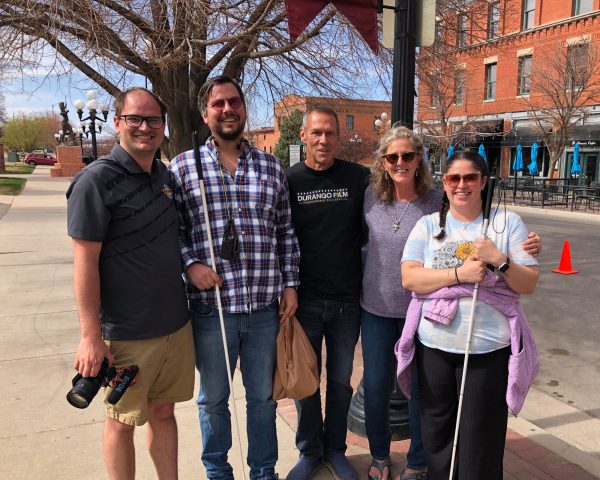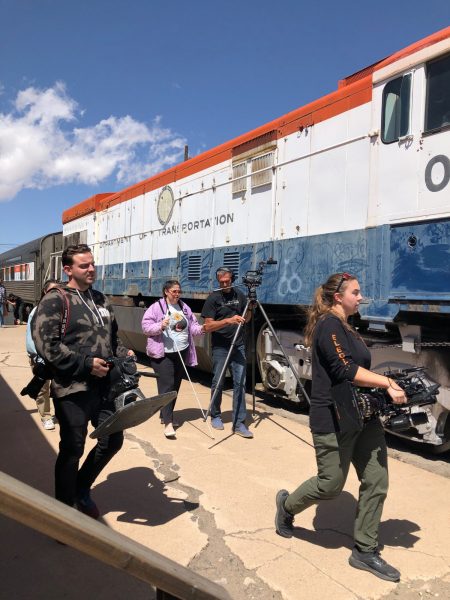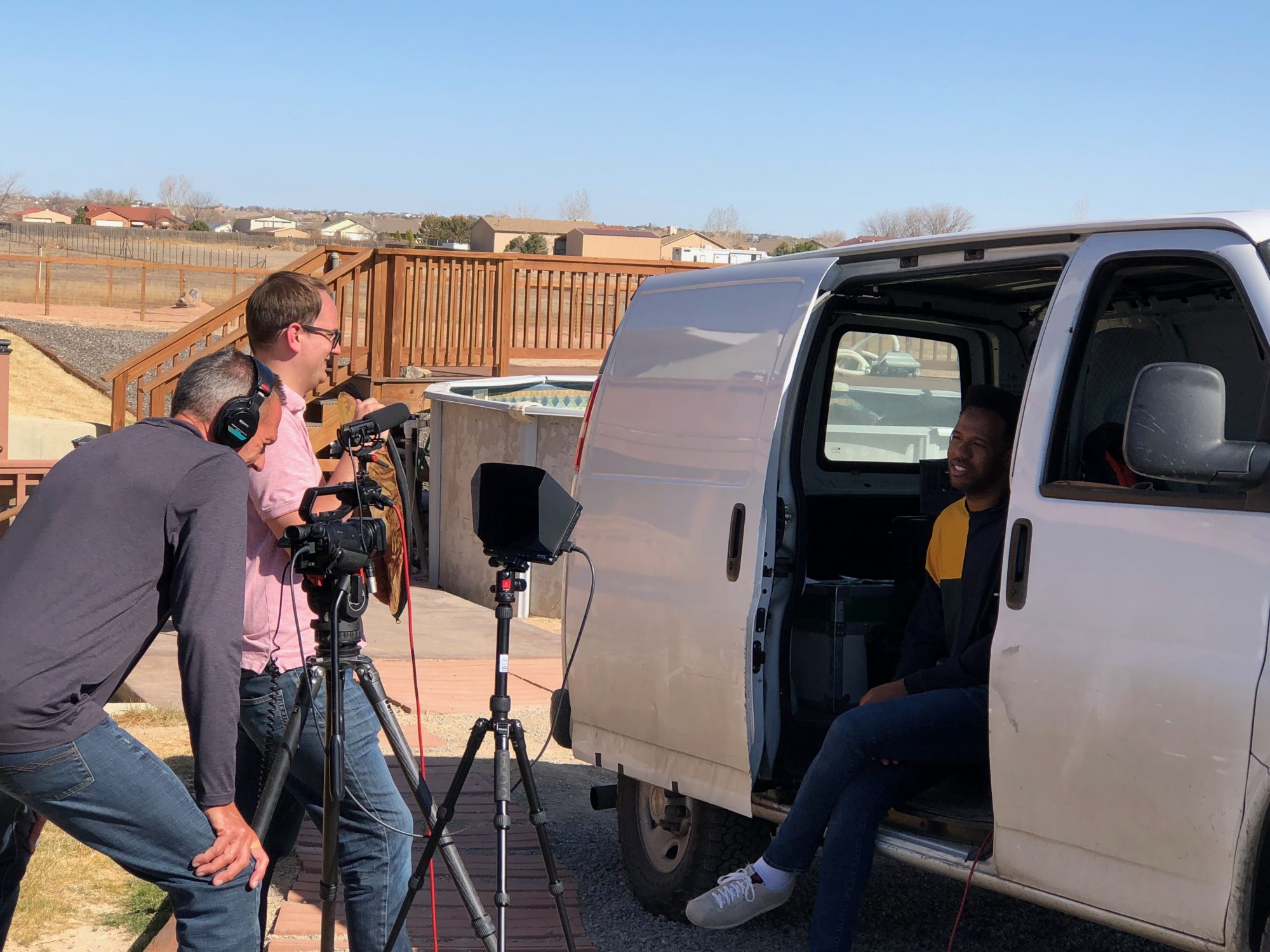
Pictured from left to right: Ryan Crist, Taylor’s partner Tommy McClure, Steve Weiss, Susie Weiss, and Taylor Aguilar while filming behind the scenes content for Sol.
Taylor Aguilar is an aspiring Latine filmmaker and 2016 alumna of the Journalism and Media Communication department. While pursuing narrative filmmaking in her Master of Fine Arts program at Loyola Marymount University in Los Angeles, Aguilar’s doctors discovered she was rapidly losing her sight, and by August of 2020, Aguilar was declared completely blind.
In the world of visual storytelling and beyond, Aguilar has had to navigate new ways to continue her journey in this career. How does she do it? How can she perceive what she cannot see? A documentary created by JMC video instructor Steve Weiss chronicles Aguilar’s experience of pursuing filmmaking while blind, and how she has overcome major obstacles to do so.
Aguilar came to CSU’s campus in the Fall of 2011 with an interest in theater, television, and filmmaking, pursuing a minor in Music, Theatre, and Sport production and working on RamProductions. Ten years later, in September 2021, Aguilar told Weiss she was blind but that she intended to continue her quest to become a film and casting director. After about thirty minutes on the phone, Weiss told Aguilar he would love the opportunity to document her story.
Aguilar’s master’s thesis film project, an autobiography called Sol, was already planned when she lost her sight. While at the Colorado Center for the Blind, she lived among many blind people as she was learning how to cope with daily life. Aguilar relearned how to do many things she took for granted: communicating via phone and computer, dressing and makeup, even feeding herself. The experience made her realize how many blind and smart, capable, funny people there were living life without sight.

After spending time learning how to navigate life blind, she returned to school to complete the program. A couple years, several trips to L.A. and Aguilar’s hometown of Pueblo, CO, and countless phone calls later, Weiss filmed the process of Aguilar completing her thesis. Weiss describes what it is like watching Aguilar and her team film: “It’s an amazing process to see her at work; she is very aware of her entire cast and crew and their movements. She relies mostly on sound and is quick to speak up if she thinks they are rushing a line or walking too fast across the scene. She also works very closely with her Director of Photography who tells her exactly where the camera is set up, the angle, the actor’s movements, and the lighting. After each take, she tells Aguilar how it all played out. When Aguilar feels confident that they have several good takes, they move on to the next scene.”
Because she is relying primarily on sound, Aguilar listens to the actor’s interactions and emotions in the scene very closely and gives them feedback. She controls the scene just as she did when sighted, starting with a “camera action” and finishing with a “cut.” Daisy Chaffee, an actor in Sol, says, “She can’t see it, but she can feel it. And I think that’s what we want to convey to audiences is to feel something, and so if your director is more in tune with that, I feel like it just makes the project even stronger.”
While skeptics may say that it is impossible for a blind person to have a significant impact on a visually driven industry like a movie project, Aguilar is at work proving them wrong. She has done everything from casting and training actors, to directing on-set to providing direction to an editor.
She can’t see it, but she can feel it. And I think that’s what we want to convey to audiences is to feel something, and so if your director is more in tune with that, I feel like it just makes the project even stronger.”
Ryan Crist, a JMC instructor and fellow alumni of the JMC program, helped film scenes of Aguilar’s Vision. He describes how “Aguilar and her camera operator rebuilt scenes out of Legos to tell her crew how she wanted the scenes set up, where she wanted the camera placed, and which way she wanted the character to go.”
Weiss himself learned a great deal about being with a blind person while filming this documentary. The situation forced Weiss to be more helpful and assertive, which eventually became second nature, telling Aguilar where she was and what obstacles were in the way. “The rest of us can be so helpful if you know what to do and when to do it,” says Weiss. “Yes, many blind people want and deserve their independence, but they also rely on our help and communication. I am very verbal when I’m around Taylor because I know she needs and appreciates it. But I am also stunned by Taylor’s capabilities; sometimes I’m not sure how she manages it.”

Many people involved in Aguilar’s project believe she is paving the way for other blind people who are pursuing filmmaking. Her timing coincides with the recent Oscar success of CODA, a movie featuring deaf people that demonstrated audience interest in characters with disabilities or challenges.
The documentary of Aguilar’s pursuit of directing a film, aptly entitled Taylor’s Vision, highlights the resiliency and determination Aguilar demonstrates and is intended to inspire others in a similar situation.
“I think that CSU Fort Collins really made me the person I am today so that I could go through these crazy life obstacles of mine and come out through the other side and know that there will be some sort of good thing that will happen from every bad situation,” she says.
Taylor’s Vision is expected to be released in late 2023.
